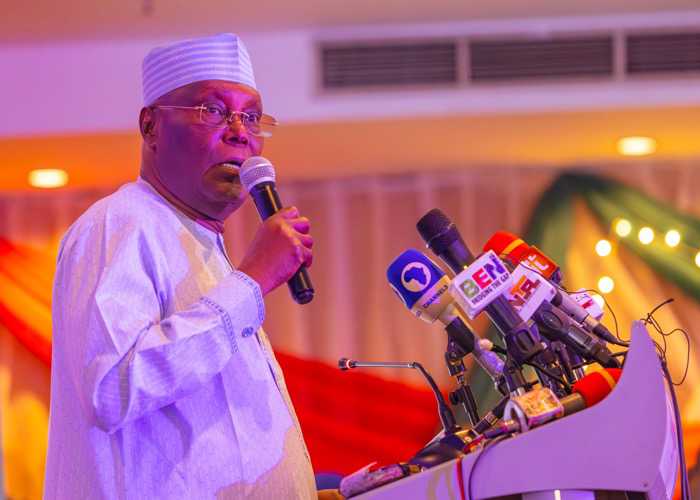FRIDAY SERMON
In the name of Allah Who states “O you who believe! Stand out firmly For Allah, as witnesses To fair dealing, and let not The hatred of others To you make you swerve To wrong and depart from Justice. Be just: that is Next to piety: and fear Allah, For Allah is well-acquainted With all ye do” Q5:9
May the everlasting peace and blessings be upon His noble servant, our master Muhammad and his pure progeny.
This piece isa short response to the need of our esteemed readers.Realistically, the Shī’ahmust stand together to enlighten the world on its genesis and relevance to refute the widely circulated propaganda. So much lies, fascinating tales and vicious calumnies! Blind critics are sponsored to write baseless versions freely distributed worldwide.Given the indifference in research,coupled with calumnious efforts of the enemies and their paid agents, allhands must be concertedly on deck to deliver the facts as a trust. In view of this, I urgeall adherents to do their best, and appeal to sincere seekers of truth to reflect on thecommand,”… Ask those who know” Q21:7. And such enquiries must not refer to biased persons who always mislead.
To do justice as Allah enjoined, why shouldn’t the opponents defeat the Shi’itesby reasons? Discuss with them on the religion in its entirety? If proof is the weapon of a believer, why are those opposed to the creed afraid of reading their books or discussing any topic of interest? Why does the creed super geometrically spread across the world? Does thatowe to ignorance or brain wash? It is good that one establishes the fact before his or her children accept the creed ahead. The earlier one seeks asincere knowledge the better. Enough is enough on the propagated liesin the 21st century. On the dramatic development, the accusing fingers mostly point at Iran and Iraq as if one couldn’t have access to any book on such issues from a judicious point of view. But with the social dynamism, only Allah knows what will happen in the next few decades. Given the religious freedom, advancement in information technology, intellectual discussions and discourses, there is no limit to the doctrinein the atmosphere of unity, freedomand justice. One with Allah is majority!Obviously, the terrorist measures of the enemies will never succeed and the victims whether in Saudi-Arabia, Yemen, Bahrain or Nigeria among others will finally emerge victorious.
LITERAL AND TECHNICAL PERSPECTIVES
According toal-Munjid,the famous Arabic dictionary, 35th edition, published by Dār al – ulūm in Beirut, Lebanon, 1987,page 411,the word Shī’ahetymologically denotes a person, two or a group ofmales, females or both. However, it is technically applied on people that believe in the divine leadership of ‘Ali and his family. Company, to accompany or followers, the more advanced Lisānul ‘Arab holds inpage 2,144 of its volume 2 in apparent tandem with the former; meaning and pronunciation wise.The word applies tothose that recognizespecific divine leadership of ‘Ali and his family (may Allah be pleased with them). Whoever is said to be Shī’ah, he or she is regarded as their adherent. Zuhrī, a renowned scholar said;Shī’ah are known for their love to prophetic progeny and recognition of their leadership. Abu Is’hāq said; when the word is related to somebody, it refers to the person’s followers. The word Shī’ah was used in the same context in the noble Qur’ān, chapter 28 verse 15 in reference to one of the followers of Prophet Mūsa (AS), as used in chapter 37 verse 8 referring to Prophet Ibrahīm as a follower of Prophet Nūh (AS).
SHI’ĀH IN PROPHETIC TRADITIONS
In a prophetic tradition narrated by Ibn Āthir who died in 606 AH, the prophet (S) addressed ‘Ali; “O ‘Ali! you and your Shī’ahwill reach Allah being pleased with Him and well pleasing Him, and your enemies will reach Him, being angry and will be seized by their necks. Then the prophet demonstrated by putting his hand on his neck”
In another tradition by the same narrator, the prophet said “Surely there is a spring in paradise sweeter than nectar, smoother than butter, cooler than ice and more fragrant than musk. In that spring is the clay (tīnah) from which we (my household and I) were created and our Shī’ah are made from the same clay” Volume 1 page 129, no. 180. The Prophet (S) also used” Shī’ah of your descendants” -believing in the divinely appointed institution. Ibn Abbas narrated; the Prophet said to Imam Ali after revelation of “Surely those who believe and do good deeds are the best of creation” Q98:7. Those are you and your Shī’ah. On the day of resurrection, you will be pleased and well-pleasing (to Allah), and your enemies will come angry and will be seized by their necks. Then he demonstrated by putting his hand on his neck. (Ibn Hajar, section 11, chapter 1, verse 11.In a prominent narration by Ibn Asākir who died in 571 AH, from Jābir Bn Abdullah who said: “Once we were with the Prophet Muhammad (S), when ‘Ali arrived, he said, I swear by Him who has my life in His hand that surely this man and his Shī’ah will be happy on the day of resurrection” then the verse “Surely those who believe and do good deeds are the best of creation“Q98:7 was revealed. From then, whenever the companions saw ‘Ali coming, they would say, the best of creation has come. -Ibn Asākir, Volume, 2, page 442 and al-Suyūtī, Volume, 6, page 589
In al-Milal wa al-Nihal, a famous source on different sects in Islām by Shahrestānī who died in 548 AH mentioned “the Shī’ah are those who followed ‘Ali in particular and believed in his imamate and caliphate according to the explicit teachings and will of the Prophet Muhammad (S)” On the other hand, al-Ḥasan Ibn Mūsa al-Nawbakhtī, a renowned scholar who died in 313 AH, mentioned in his book, Firaq al-Shī’ah, “the Shī’ah are the party of ‘Ali son of AbīṬālib. They were called Shī’ah of ‘Ali during and after the life of the prophet and were known as the followers of ‘Ali and believers in his Imamate” Page 17.
Sheikh al-Mufīd, a remarkable Shī’ah scholar who died in 413 AH, defined Shī’ah as followers of ‘Ali and believers in his immediate successorship to the noble Prophet, with further elaboration on Imāmiyyah alternatively known. This is a title for those who believe in the necessity of Imamate and continuity in all ages and that every Imām must be explicitly designated, infallible and perfect. In the light of the above definition, the Shī’ah believe that successorship to the noble prophet was absolutely divine appointment. As the prophet was appointed, so also the Imām on prophet’s promulgation, starting with Imām Ali to Imām, Muhammad al-Mahdī (AS). Some of the well-knownShī’ah among the companions were Abdullah Bn Abbās, Naufal Bn Harith, Salmān al-Farisī, Miqdād Bn al-Aswad, AbuDhārr, Ammar Bn Yassir, Huzaifa Bn al-Yamāni, Khuzaimah Bn Thābit, Abu Ayyub al-Ansārī, Saad Bn Ubādah, Ubayyu Bn Kaab, Bilāl al-Habashi, Hujr Bn Addī, Jābir Bn Abdullah al-Ansārī, Muhammad Bn Abi Bakr and Sahl Bn Hunaif among others.
Unlike Ahl al-Sunnāh wa al-jamā‘ah which sprang in the year of Jamā’ah during the Umayyad Mu’āwiya-led regime, the Shī’ah, otherwise original Islām was first heard from the Great Messenger (S). Although more attention is focused on political issues in most discussions on Shī’ah /Sunnāh,theological and jurisprudential aspects are very important. Interestingly, books are generally available in soft and hard copies. Currently, there are many living religious authorities that issue religious verdicts, their jurisprudential books and sites are also readily available for consultation. We also have competent scholars that could be referred to in search of truth and guidance.
Beside theUsūlal-dīn,fundamentals;tauhīd-monotheism, ‘adl-divine justice, nubūwat– prophethood, imāmah – leadership and ma’ād– the day of judgment, we have ten branches that comprise of prayer, fasting, poor rate, pilgrimage to Mecca, Khums, enjoiningright and preventing bad, allegiance to Ahlul-bait and dissociation from their enemies,and jihad which ismultifaceted in context. Simply, Shī’ismis a belief on fundamentals, branches and practices, alternatively the original Islam. It has nothing to do with membership inany registeredpolitical party, non-governmental organization or group. And whoever believes and practices is a Shī’ah. Proudly, with the apparent teachingsof wilāyatul faqīh, by the great founder Islamic republic – Imām Khomeinī(QS), and the August Leader of the Islamic Revolution, Sayyid ‘Ali Khamne’ī, the real followers of the creed are neither subservient to West nor East. They fight against tyranny and oppression for the establishment of justice in favor of Islam and humanity.
While urging our esteemed readers to refer to sincere and knowledgeable scholars, books and sites for more information and guidance, I stress the need for the release of Sheikh el-Zakzakī and his disciples amidst the disastrous pandemic.
Wassalāmu alaykum.
Follow the Neptune Prime channel on WhatsApp:
Do you have breaking news, interview request, opinion, suggestion, or want your event covered? Email us at neptuneprime2233@gmail.com





